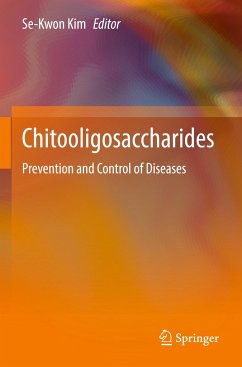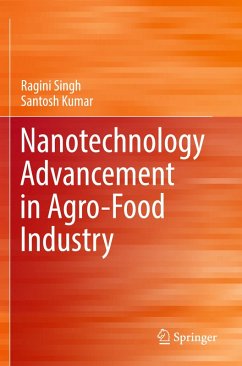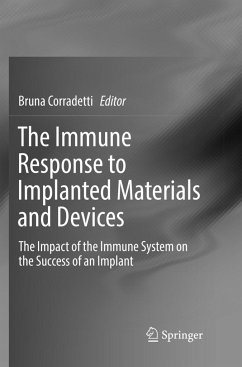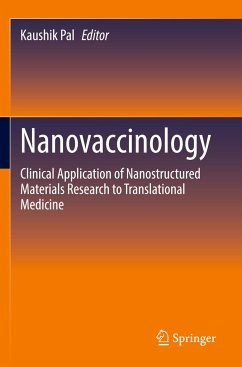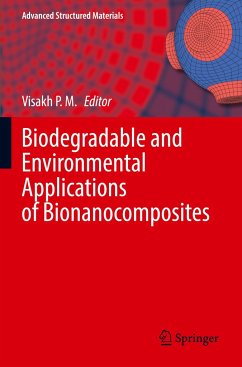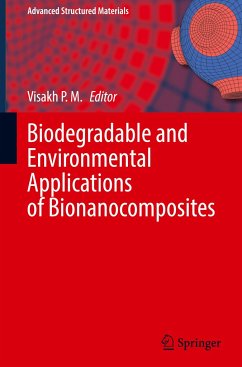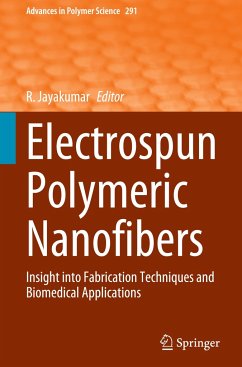
Chitooligosaccharides
Prevention and Control of Diseases
Herausgegeben: Kim, Se-Kwon

PAYBACK Punkte
53 °P sammeln!
This book outlines the production of chitooligossacharides and their derivatives and discusses their main biological activities, biomedical applications and their role in disease prevention. Chitooligosaccharides are products of chitosan or chitin degradation, prepared by enzymatic or chemical hydrolysis of chitosan, and they consist mainly of N-acetyl glucosamine and glucosamine bonded with a glycosidic bond. Compared to chitin and chitosan, chitooligossacharides offer advantages for large-scale and commercial applications due to their solubility in water and lower molecular weight.Written by...
This book outlines the production of chitooligossacharides and their derivatives and discusses their main biological activities, biomedical applications and their role in disease prevention. Chitooligosaccharides are products of chitosan or chitin degradation, prepared by enzymatic or chemical hydrolysis of chitosan, and they consist mainly of N-acetyl glucosamine and glucosamine bonded with a glycosidic bond. Compared to chitin and chitosan, chitooligossacharides offer advantages for large-scale and commercial applications due to their solubility in water and lower molecular weight.
Written by leading experts, this book is divided into four parts. The first part provides a general introduction to chitooligossacharides. The second part focuses on the bioproduction of chitooligossacharides through enzymatic synthesis and also covers physical and chemical methods of synthesis. The third part explores the major biological activities of chitooligosaccharides, including antioxidant, antimicrobial, anti-allergic, anti-inflammatory, anti-cancer and neuroprotective activities, and discusses the disease preventing mechanisms of chitooligosaccharides. In this section, readers will also find about the latest in vivo studies which support the use of chitooligosaccharides in the prevention and control of disease. The final part highlights important biomedical applications of chitooligosaccharides, including in tissue engineering, drug delivery and wound healing applications. It also includes the volume editor's perspective on the health and safety risks of chitooligosaccharides.
Given its scope, this book is useful not only for researches in the field but also for students interested in biomaterials, pharmaceuticals, marine biotechnology, nutraceuticals and food science.
Written by leading experts, this book is divided into four parts. The first part provides a general introduction to chitooligossacharides. The second part focuses on the bioproduction of chitooligossacharides through enzymatic synthesis and also covers physical and chemical methods of synthesis. The third part explores the major biological activities of chitooligosaccharides, including antioxidant, antimicrobial, anti-allergic, anti-inflammatory, anti-cancer and neuroprotective activities, and discusses the disease preventing mechanisms of chitooligosaccharides. In this section, readers will also find about the latest in vivo studies which support the use of chitooligosaccharides in the prevention and control of disease. The final part highlights important biomedical applications of chitooligosaccharides, including in tissue engineering, drug delivery and wound healing applications. It also includes the volume editor's perspective on the health and safety risks of chitooligosaccharides.
Given its scope, this book is useful not only for researches in the field but also for students interested in biomaterials, pharmaceuticals, marine biotechnology, nutraceuticals and food science.



